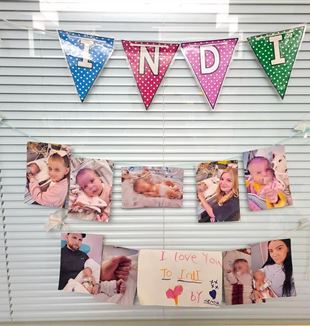
Indi Gregory and the courage of hope
While the fate of the English child is being decided, CL stands by her and her family and supports their demands, also in light of her possible transfer to Italy. The words of Davide Prosperi.In these hours of worry, mobilization and prayer for little Indi Gregory, during which so many are rightly fighting so that her parents may see their wish fulfilled to accompany her with all their love and with the support of an adequate health facility, for the time she is given to live, that radical question dramatically emerges that is at the basis of any necessary discussion on the ethical, educational and legal implications of the matter. It is the question of what meaning there is in pain and in particular, as in this case, in innocent pain. Indeed, the English judge dealing with the case argues that it is ‘in Indi’s interest’ not to prolong her suffering. An ‘interest’ that the child’s parents, according to the judge, are not able to see. Is pain and limitation therefore an objection that ‘must’ prevail over life and love? Getting to the heart of the matter: why does God allow innocent pain? I believe that only by allowing oneself to be wounded by the sting of this question can one look at what is happening to Indi and her parents with hope, and be at their side without allowing oneself to be overwhelmed by the suffering, the fatigue, the world’s incomprehension, “the hell” of which Indi’s father spoke as he left court. And to understand why the judge is wrong in this case and Indi’s parents are right: if suffering has a meaning, then it is right to spend every possible effort to accompany those who suffer, with that love and care that each person, in his or her great mystery, deserves.
In 2011, Benedict XVI replied as follows to a little girl who asked him for an explanation for the pain of her peers: “We do not have the answers but we know that Jesus suffered as you do, an innocent… This seems very important to me, even if we do not have answers, even if we are still sad: God is by your side.” A few years later, Pope Francis said this on the same matter: “This question is one of the most difficult to answer. There is no answer!” And then he added: “‘What can I do so that a child won’t suffer or will suffer less?’. Be close to him! Society seeks to have care centres, healing centres, also centres of palliative care so that children won’t suffer; progress in educating sick children.”
And again, just a few days ago, speaking on the Israeli-Palestinian affair, whose fate is holding us all in suspense, Cardinal Pizzaballa commented: “A new reality and a new order begin on the cross. The order and the reality of the one who gives his life out of love. […] God’s answer to the question of why the righteous suffer is not an explanation, but a Presence. It is Christ on the cross. It is on this that we stake our faith today. Jesus in that verse rightly speaks of courage. […] I want, and we want, to be part of this new order inaugurated by Christ. We want to ask God for that courage. We want to be victorious over the world, taking upon ourselves that same Cross, which is also ours, made of pain and love, of truth and fear, of injustice and gift, of cries and forgiveness.” As Fr. Giussani once said: “What courage it takes to sustain the hope of men! It takes courage to share the suffering of men.”
Rereading these statements reminded me of a personal experience. A few years ago, the La Mongolfiera association, a non-profit organisation committed to helping families with disabled children, asked me to write the preface to the book that tells their story through the testimonies of families involved. Writing that text forced me first of all to face those same questions. Questions that Indi’s story, as well as that of the many innocent children who die today as a result of wars and persecutions, raise again in all their inevitability. It is by looking at those families of La Mongolfiera, those disabled children and their parents, that it was possible for me to begin to give a name to the mystery of pain. Charles Péguy says it grandly: “You children imitate Jesus. Do not imitate him. You are child Jesuses. Without realising it, without knowing it, without seeing it.”